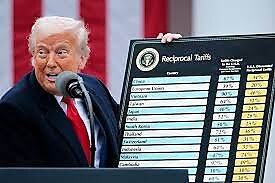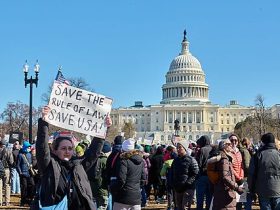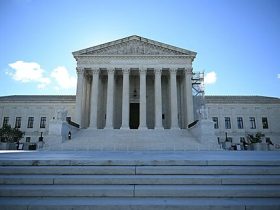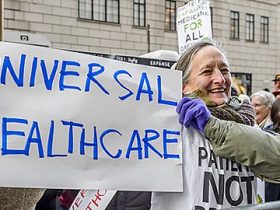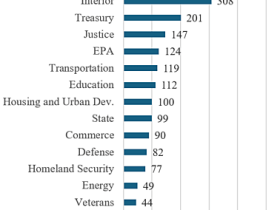Tad DeHaven and Nathan Miller
Over the weekend, President Donald Trump’s eulogy at conservative activist Charlie Kirk’s memorial service unfortunately spun off into a politically charged airing of grievances. After declaring that his “[t]ariffs are making us rich again,” for example, Trump added that “the only ones challenging them are people that hate our country or foreign countries that are paying a price.”
The facts, of course, say otherwise.
For the hundredth time, Trump’s import taxes are mainly paid by American importers and consumers, not foreign countries. And all the companies challenging the tariffs in court today are American small businesses, who are doing so not out of “hate” (or whatever) but simply because the president of the United States has singlehandedly put their livelihoods at risk.
Today, we’ll look at these businesses to set the record straight.
But first, the background: In May, the Court of International Trade ruled in Trump v. V.O.S. Selections that tariffs imposed by the administration weeks earlier under the International Emergency Economic Powers Act (IEEPA) were unlawful. The Court of Appeals for the Federal Circuit subsequently affirmed the CIT’s ruling that IEEPA’s grant to “regulate” imports is not a blank check allowing the president to impose a global tariff wall. In a related case, Learning Resources, Inc. v. Trump, the District Court for the District of Columbia came to the same conclusion. The Supreme Court recently fast-tracked an appeal and consolidated these cases; oral argument is scheduled for early November.*
Along with several state attorneys general, here are the plaintiffs in the litigation now before the Supreme Court:
V.O.S. Selections (NY): A 39-year-old, family-run importer specializing in small-production wines, spirits, and sakes from across the globe. Trade gives American consumers access to Japanese sake while Japanese consumers enjoy Kentucky bourbon. A tax on a bottle of Italian Chianti doesn’t “bring back” an American alternative; it just kneecaps an American distributor providing customers with a breadth of options “unimaginable by even the greatest emperors of millennia past.”
V.O.S. owner Victor Owen Schwartz: “Ten percent is a massive amount, not to even mention 20 percent or 50 percent. Those numbers—they’re not even real …. They’re so impactful, you would just throw in the cleats. So it’s uncertainty, it’s financial impact, it’s cash flow, strangulation—it’s all of those things.”
Plastic Services & Products d/b/a Genova Pipe (UT): An American manufacturer with seven US facilities that imports resins and machinery to make American pipes. Tariffs on those imports don’t punish other countries. Instead, they raise Genova’s costs, undermine its business, and punish the US manufacturing that Trump claims to support.
Genova Pipe owner Andrew Reese: “We operate seven manufacturing facilities across the United States and are committed to producing high-quality products in America. With limited domestic sources, we rely on imports to meet our production needs. The newly imposed tariffs are increasing our raw material costs and hindering our ability to compete in the export market.”
MicroKits (VA): A tiny Charlottesville shop that hand-assembles educational electronics to teach America’s future generations about electrical engineering. The company relies on being able to source parts from abroad, many of which aren’t made in the US. What’s “American” about making it harder for a two-person business to teach kids how circuits work? Without relief from the tariffs, the company could be forced to shut down.
MicroKits founder David Levi: “For a business like mine, [the tariffs are] a death sentence … I could place an order for parts today, and by the time it arrives, the tariff might have doubled. I can’t plan. I can’t budget. I can’t grow … This isn’t about partisan politics. It’s about whether one person should be able to change the entire trade system overnight. If that’s allowed to stand, how can small businesses like mine ever feel safe?”
FishUSA (PA): A 25-year-old retailer/wholesaler for anglers. Trump’s tariff roulette forced them to delay shipments, pause some private-label production, and shelve growth plans. It’s an example of how policy uncertainty alone undermines economic activity. A rural Pennsylvania company called “America’s Tackle Shop” probably doesn’t hate America.
FishUSA CEO Dan Pastore: “We built this company from a garage with nothing but a love for fishing and a commitment to customer service … We’ve stayed resilient through recessions and the rise of e‑commerce. But these tariffs—and the uncertainty they create—threaten everything we’ve worked for.”
Terry Precision Cycling (VT): A Vermont company that designs women’s cycling apparel. It can’t source fabrics or finished goods domestically at the quality and price it needs to stay competitive, so it relies on imports. The tariff hit has moved from painful to impossible: about $25,000 in unexpected duties already this year, with total tariff costs expected to reach roughly $250,000 by the end of the year. The figure for 2026 could hit $1.2 million, which the company won’t be able to survive. Terry has raised prices, cut product lines, and reduced availability to retail partners to cope.
Terry Precision Cycling CEO Nik Holm: “For us, this lawsuit isn’t just about dollars.… It’s about defending the right to build and run a business without getting crushed by unpredictable government overreach.”
Learning Resources and hand2mind (IL): A pair of family-owned educational toy companies. Learning Resources’ CEO says tariff chaos turned a $2.3 million tax bill into a projected $100 million for 2025, forcing him to scrap a 600,000 square foot expansion and freeze hiring. Its sister company, hand2mind, makes classroom supplies. There’s nothing “pro-America” about punishing investment in educational toys and raising the cost of learning.
Learning Resources CEO Rick Woldenberg: “We’re standing up for ourselves.” These taxes “directly threaten what we do. We have 500 employees with 500 families who depend on our company for their well-being … and you know, darn it, we’re not going down without a fight.”
Far from “hating America,” these businesses represent a cross-section of American entrepreneurial success: importers, assemblers, manufacturers, and retailers employ workers and satisfy American consumers. Today, they’re fighting to stop a single government official from unilaterally taxing them and their employees out of business.
Once upon a time, small business owners like Patrick Henry, Paul Revere, and Samuel Adams mustered the courage to challenge a king’s taxation without representation. Given our country’s founding, we can think of little more American than today’s small business owners upholding that legacy.
*For more on the court cases and the arguments in support of the plaintiffs’ litigation, see Cato legal scholar Ilya Somin’s “The Constitutional Case Against Trump’s Trade War,” “A Victory for Separation of Powers,” “Not Everything Is an Emergency,” “Federal Circuit Rules Against Trump’s Massive IEEPA Tariffs,” and “Supreme Court Will Hear Our Case.” See also the Liberty Justice Center’s compilation of the various legal filings and other resources.


